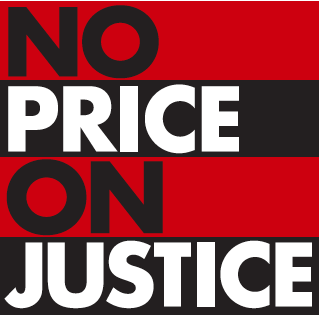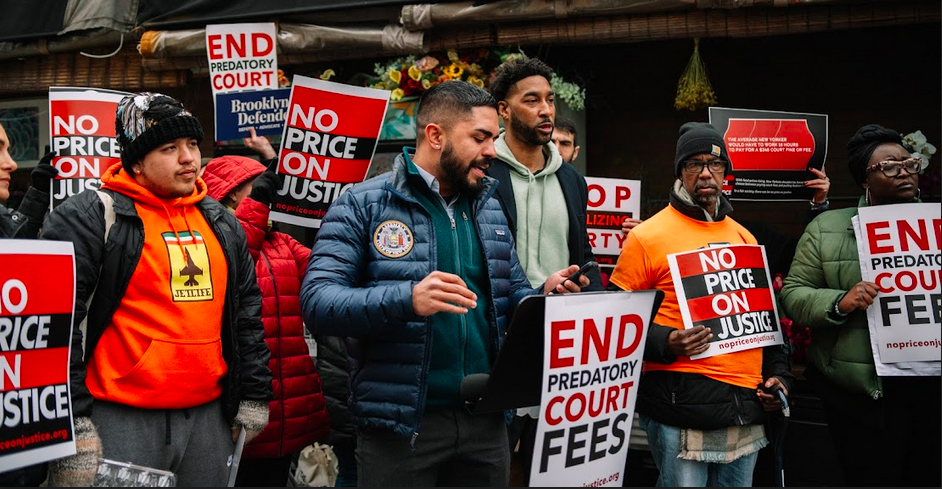MEDIA ADVISORY
MARCH 15, 2023
Contacts:
Katie Schaffer, kschaffer@communityalternatives.org, 646-265-2044
AT STATE CAPITOL, LAWMAKERS & ADVOCATES CALL FOR PASSAGE OF THE END PREDATORY COURT FEES ACT
AS ELECTED OFFICIALS DEBATE THE STATE BUDGET, NEW YORKERS PLAGUED BY COURT DEBT CALL FOR THE END OF REGRESSIVE TAXATION & THE CRIMINALIZATION OF POVERTY
WHEN:
Thursday, March 16 at 10:30am
WHERE:
LOB Press Room #130, Legislative Office Building, Albany
Also available via Zoom livestream here
WHAT:
Press conference at the New York State Capitol to demand passage of the End Predatory Court Fees Act, featuring lawmakers, advocates, and New Yorkers plagued by court debt and the criminalization of poverty. Introduced by State Senator Julia Salazar and Assemblymember Kenny Burgos, the End Predatory Court Fees Act would eliminate state court fees and probation fees, mandatory minimum fines, incarceration on the basis of unpaid fines and fees, and garnishment of commissary accounts. As lawmakers debate the State Budget, speakers will demand an end to New York’s dangerous reliance on court fees — a regressive form of taxation that traps millions of low-income residents in a vicious cycle of debt and punishment.
WHO:
Speakers will include state legislators, as well as impacted New Yorkers and advocates, including:
- Assembly Member Burgos, lead sponsor
- Assembly Members Chantel Jackson, Khaleel Anderson, Jon Rivera and Harvey Epstein
- Alisha Kohn, Newburgh LGBTQ
- Nyatwa Bullock, Center for Community Alternatives
- Antonya Jeffrey, Fines and Fees Justice Center
- James Inniss, New York Communities for Change
- Paula Garcia-Salazar, Legal Aid Society
- Jackie Gosdigian, Brooklyn Defender Services
- Zachary Ahmad, New York Civil Liberties Union
VISUALS:
Signs saying “End the Criminalization of Poverty,” blown-up court receipts highlighting the cost of court fees, and milk jugs and egg cartoons illustrating the impossible choice faced by families: whether to put food on the table, or to pay down court debt in order to avoid incarceration and additional fees.
BACKGROUND:
- The End Predatory Court Fees Act — which would end the state’s mandatory surcharge along with probation fees, mandatory minimum fines, incarceration on the basis of unpaid fines and fees, and garnishment of commissary accounts — was recently reintroduced by State Senator Julia Salazar and Assemblymember Kenny Burgos.
- Dozens of states and localities in states both red and blue have enacted reforms to eliminate fees in recent years.
- New York’s mandatory surcharge was first implemented in the 1980s with the explicit purpose of raising state revenue. Since then, state lawmakers have repeatedly increased the amounts over the years, despite failing to keep legally mandated records on how New York assesses, collects, and distributes this revenue.
- People who can’t afford fees are subjected to punishments that trap them in a cycle of poverty and criminalization: incarceration, prolonged or indefinite supervision, and additional fees — with communities of color and low-income communities suffering the most. New York courts issue thousands of civil judgments and warrants every year, and may even order immediate incarceration for failure to pay.
- The financial costs of court fees are disproportionately borne by women. A recent study found that almost half of the family members primarily responsible for paying court-related costs were mothers, and one in ten were grandmothers.
- In the one-house budgets released yesterday, the Senate and Assembly included additional taxation on New York’s richest residents, but did not provide relief to New Yorkers subjected to the regressive taxation of New York’s court fees.
- A recent report demonstrated that New York’s mandatory surcharge — a supplemental fee assessed in nearly every criminal, traffic, and local ordinance case — is among the most burdensome in all 50 states. New York is one of only four states — along with Alaska, Minnesota and Mississippi — with statutes explicitly providing that an individual’s inability to pay does not exempt them from owing these fees.
- Research shows that some jurisdictions spend more tax dollars attempting to collect fines and fees than they actually receive. At a budget hearing earlier this month, Assembly Member Burgos asked the Chief Administrative Judge Tamiko Amaker whether courts spend more on collection efforts than they take in. Amaker was unable to answer the question.
- With the cost of basic needs rising, more New York families are facing an impossible choice: whether to put food on the table, or to pay down court debt in order to avoid incarceration and additional fees. In 2022, food prices increased drastically — 10% on average — putting families living paycheck-to-paycheck in a precarious position.
###
About the NO PRICE ON JUSTICE campaign:
No Price on Justice is a coalition of economic and racial justice organizations, grassroots groups, and impacted people working to end New York’s predatory court fines and fees.
Members of the No Price on Justice coalition include: Brooklyn Defender Services, Center for Community Alternatives, Citizen Action, Children’s Defense Fund, Color of Change, Community Service Society, Fiscal Policy Institute, Fines and Fees Justice Center, Legal Aid Society, New York Civil Liberties Union, New York Communities for Change, Partnership for the Public Good, and a dozen other organizations from across New York State.
###


Recent Comments